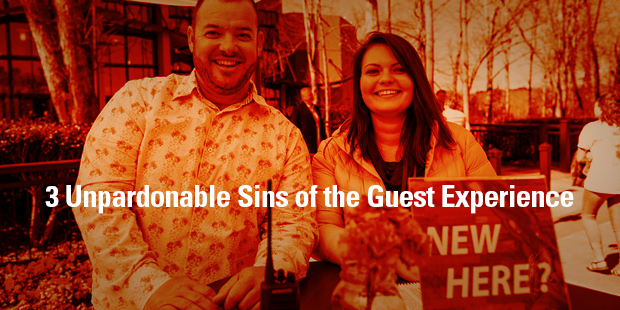
3 Unpardonable Sins of the Guest Experience
Some of your visitors are looking for reasons not to return.
These guests are difficult to please. If they look for the flaws in your church, they will find them. There are no perfect churches, and pleasing everyone is impossible. Do your best to love everyone, but the prospect of chasing people who are intent to run is usually a futile process.
Some of your visitors are looking for reasons to stay.
These guests are looking for a few things that are important to them, such as friendship, spiritual growth, help in a crisis, or a healthy environment for their kids. If they find a few things they care most about, they will overlook a few less than ideal aspects of your church.
In fact, it’s amazing how forgiving people can be if you treat them well as a person.
The musicians on your worship team may not be world class, or perhaps you don’t have enough parking, or maybe your student ministry isn’t what you want it to be. But if you treat people well they are usually pretty forgiving.
This is not an excuse to ignore the things that need attention, but it’s enough grace to know that you can still do great ministry while you work on what needs to be improved.
First time guests and people new to your church will give lots of grace for the flaws and shortcomings if you treat them with:
- Kindness
- Respect
- Love
But there are some things people who are new to your church will not forgive. These are mistakes you cannot afford to make.
3 Experiences Guests Won’t Forgive:
1) If you treat their kids as a program to be managed rather than kids to be loved.
Structure can beat out spirit, and the programs and processes can become more important than the person.
This can happen in any ministry in your church, but there is little to no grace when it comes to people’s kids.
I’m willing to bet that the heart of your church is about life change, meaning, and real spiritual transformation through Christ. You want to see the children love Jesus and enjoy church!
But here’s where it breaks down. If you begin to make your children’s ministry easier on the staff and volunteer leaders by making it more difficult for the parents and kids, you are making a big mistake. You’d never do that on purpose, but it happens.
The leaders must always absorb the pressure, not the guests.
If the kids become a number in the check-in process or are scolded more than encouraged because they didn’t behave just right, or there are so many rules that it’s impossible to keep up with, it’s highly unlikely that the new families will return.
2) If you treat the adults in any way “less than.”
Most reasonable adults are pretty resilient. As I’ve said, they understand there is no perfect church. But if you treat them poorly as a person, you don’t get a second chance.
One thing that’s easy to forget is that even though someone may be spiritually unresolved or disconnected, they are still usually spiritually sensitive.
If the pastor says something that makes a person feel spiritually foolish, or an usher or greeter treats someone with disrespect, they won’t give you a second chance.
We can’t live on pins and needles worrying about offending everyone, but we can do our best to serve with intentional love and grace.
I remember several years ago trying to help a young mom tend to her crying baby in church. I did my best to be kind and respectful, but I inadvertently offended her by asking her to take her child to the nursery. Maybe I could have done a better job, or perhaps it was a no-win situation, but the result was she was upset and said she’d never come back.
Most of these situations are nuanced and unintentional, but it’s so important to do our best to treat our guests with love, respect, and kindness.
3) If you treat any guest with an eye to get more than you give.
It might seem nearly impossible for a church team to treat any guest in such a way where that person felt like you wanted more from them than for them. But once again, this is easier than it sounds.
Church leaders are often under pressure. They are under pressure for things like more volunteers, larger offerings, and support in general for the vision and direction of the church.
For example, if a church is hurting for more volunteers, they can put pressure on people, including guests, to sign up.
When pressure (or even guilt) is employed rather than inspiration and encouragement, you have fallen into the mistake of wanting more from the people than for them. Your guests have no appetite for that.
Another example might be if a church is behind in the budget. That can sometimes “leak” out in a sermon, or during the time to receive the offering. This kind of pressure makes it feel like the church wants more from the person than for them. If this is what your guests experience, they are not likely to return.
Kindness, respect, and love will always help you treat people well.
Want to know more about Guest Experiences at your church? Let’s talk! Connect with an Auxano Navigator here.

Tags: Church Guest Experience, Dan Reiland, Guest Experience, Hospitality, Welcome, church hospitality












